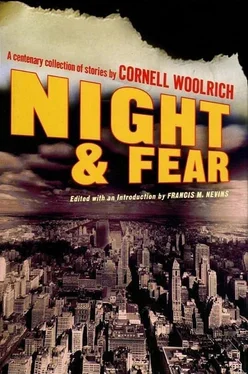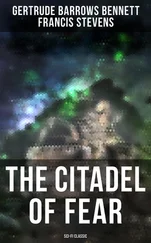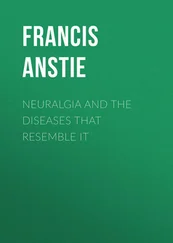“Now, I’ve got to locate the exact compartment you were in, and that’s not going to be an easy job, the way those places are all alike.”
“Wait,” she said, “I think I can help you. It’s not much of a thing to go by, but— Those lanterns in each cubicle — did you notice that they all have a character heavily inked in on them?”
“Yeah, I couldn’t tell one from the other. They’re laundry-tickets to me.”
“I don’t mean that. The one in our booth was finished in a hurry or something, the craftsman inked his brush too heavily. Anyway, a single drop of ink came to a head at the bottom of the character, with the slope of the lantern. It ran down a little way, left a blurred track ending in a dark blob. It was staring me in the face in the beginning, before I changed places, that’s how I know. Here, give me a pencil — all right this burnt match-stick will do. It’s very easy to remember, you don’t need to know what it means. Two seagulls with bent wings, one above the other. Under them simply a pot-hook. Then this blot of dried ink hanging down from that like a pendulum. Look for that, and you’ll have the cubicle we were in. I don’t think they’ve bothered to remove the lantern, because they wouldn’t expect a foreigner to notice a little thing like that.”
“Neither would I,” he said and nodded approvingly at her. He picked up a razor blade from the edge of the washstand, carefully sheathed it in a fragment of newspaper.
“What’s that for?”
“To let myself in with. In some ways, paper houses are pretty handy. Lock yourself in here behind me, just to be on the safe side. I’ll give you the high sign when I come back. Don’t open up for anybody else at all.”
She moved after him to the door. “You’ll never make it in that uniform. It’s all torn.”
“I’ll take care of that, borrow something from the Roosky downstairs. Try to get some sleep and get that dope out of your system.”
The last thing she murmured through the crack of the door as he slid out into the hallway was, “Please be careful.”
“Okay, lady,” he said with a grin, saluting jauntily from the eyebrow.
The Russian, behind the shelf that served for an accommodation desk, growled, “Eh, tzailor! Is no fight by back of house, why you tell me to go look?” He pointed to the split middy. “I tink you fight youself.”
“Never been known to. Listen, I gotta go out and it’s cold. Lend me a hat and coat.”
“Sure, bott you leaf deposit. How I know you come back?”
“Here’s your deposit, suspicious guy.” It felt funny to have something with a brim to it on his head, after two years. The bell-bottomed pants were a give-away, but he counted on the darkness to take care of that. He had to fasten the coat’s top button over his bare neck, where civilians wore collars and ties.
A quarter of an hour later he was casually strolling past the front of the Stolen Hours again, hands in pockets, hat-brim tipped down to his nose. The place was shut up tight, whether by police order or at its owner’s discretion he couldn’t tell. Probably the latter, for no policeman had been left posted outside the premises. The Yoshi had quieted down. Lights still peered out up and down its byways, but the dance halls and pool-parlors had closed up shop for the night, and the only wayfarers in the streets now were homeward-bound drunks and an occasional pickpocket or lush-worker sidling past in the shadows.
He didn’t try to get in the Stolen Hours from the front, but went around the block to the next street over, located the lane they’d escaped through and threaded his way along it. There was a bamboo wicket barring it at the inner end. He didn’t bother with it — just climbed up over with a seaman’s agility and dropped soundlessly down on the inside.
The lanterns were out and the garden was lifeless. The faint gurgle of the brook was the only sound there was. Hollinger stole over the bridge, a looming, top-heavy figure out of all proportion to its microscopic measurements; he was still without shoes, never having recovered his footgear after that first flight. He obliterated himself under the uptilted roof-projection that shadowed the rear of the house, with only the heels of his torn white socks showing in the gloom.
Only taut paper faced him. They didn’t use locks or bolts apparently but hitched the frames up fast in some way on the inside. He took out the razor blade and made a neat hair-line gash down alongside the frame, then another close to the ground, making an L around the lower corner. He lifted it up like a tent-flap and ducked through. It cracked a little, but not much, fell stiffly into place again.
The house seemed deserted. Hollinger couldn’t be sure whether or not the manager slept here after hours. The geishas and other employees probably didn’t. He could hear bottled crickets chirping and clacking rhythmically somewhere ahead and didn’t, unfortunately, realize that crickets are used as watchdogs in Japan. They stop chirping whenever a stranger enters the house. They did that now. The sound broke off short almost at the first tentative steps he took, and didn’t resume.
He worked his way forward feeling his way along the cool slippery wooden flooring with a prehensile toe-and-heel grip, shuffling the multiple deck of screens aside with a little upward hitch that kept them from clicking in their grooves. He waited until he was nearly midway through the house, as far as he could judge, before he lighted his first match. He guarded it carefully with the hollow of his hand, reduced the light to a pink glow. The place seemed deserted.
He tried six of the cubicles before he got the right place. There it was. Traces of Mallory’s blood still showed black on the floor. The smeared ink-track on the lantern was just a confirmation. He lit the wick and the lantern bloomed out orange at him, like a newly risen sun.
The location of the blood smears told him which of the four sides to case. The screen out in place at the moment was, as she had said, intact. He ran his fingers questioningly along its frame, to see if it felt sticky, damp, with newly-applied paste. It was dry and gave no signs of having been recently inserted. He could see, now, that the inserts weren’t glued into the frame at all, they were caught between the lips of a long, continuous split in the bamboo and held fast by the pressure of the two halves of the wood closing over them again, helped out by an occasional little wooden nail or peg. They couldn’t be put in a hurry.
But they could be taken out in a hurry, couldn’t they? He shoved it all the way back flush with the two lateral screens, and squinted into the socket it had receded into. There were two frame-edges visible, not just one. He caught at the second one, and it slid out empty, bare of paper! But there were tell tale little strips and slivers of white all up and down it where the paper had been hastily slashed away.
He just stood there and nodded grimly at it. “Unh-hunh,” he said.
Probably the frame itself would be unslung tomorrow and sent out to have a new filler put in. Or destroyed. They hadn’t had the opportunity tonight, with the place buzzing with police. He didn’t think the rest of the staff had been in on it — just the manager and the murderer. The fact that the girl’s last-minute change of position hadn’t been revealed to them in time showed that. The geishas waiting on the couple would have tipped them off if they’d been accessories. They hadn’t, and Mallory had been killed by mistake. But she’d only arrived the day before — why did they want her out of the way, not him?...
Hollinger pondered.
There was no audible warning. But his shifting of the slide had exposed the assassin’s compartment beyond the one he was in, and the lantern-light reaching wanly to the far screen of that threw up a faint gray blur overlapping his own shadow — a shadow with upraised arm ending in a sharp downward-projected point. Seeing that shadow saved his life.
Читать дальше












